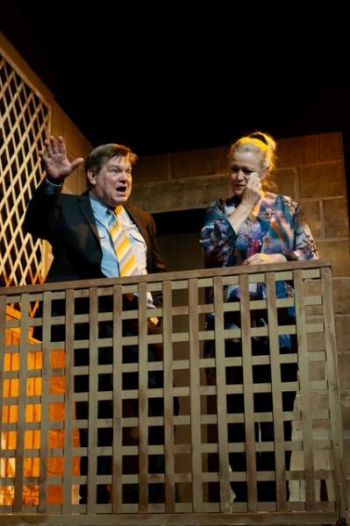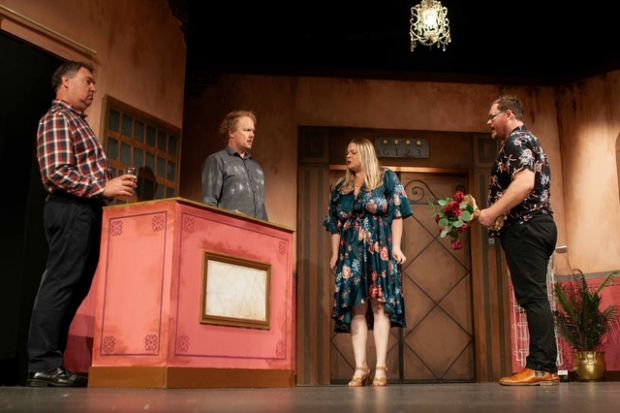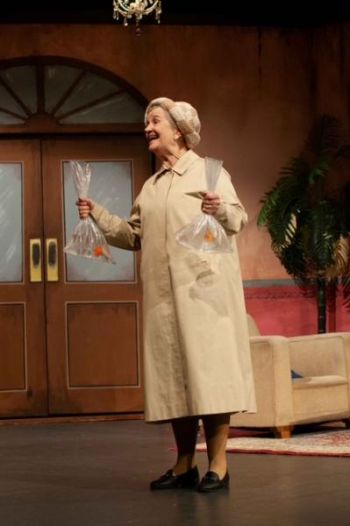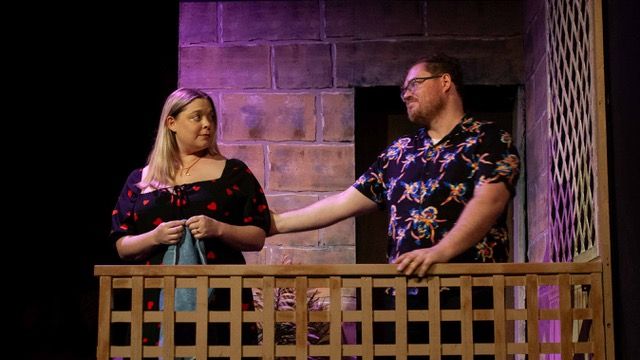Life Without Me
It is always a pleasure to visit the cosy confines of the Stirling Community Theatre. It has a welcoming atmosphere and located in a unique Adelaide Hill’s location!
Stirling Players’ latest production is a SA premiere of a refreshing, comparatively new Australian play that succeeds on many fronts.
Life Without Me is a 2010 existential comedy (with just a tough of the absurd) set in a run-down hotel where seven characters, each struggling with their own personal problems, find themselves stuck – both physically and emotionally. They can’t escape until they have found purpose in their lives. It’s a bit like Schmigadoon, but without the music!

It explores themes of identity, purpose and the meaning of life combining humour and melancholy. It examines stagnation, absurdity of the everyday, loneliness and connection. These themes create some memorable moments and some that seem to be overwritten which results in variations of pace.
Director Megan Dansie, well known to Adelaide audiences, has assembled an experienced cast who use the performance space to its full advantage. Scene changes are swift and the characters are well developed. Her understanding of the text is evident in every line.
Stirling Players are well known for their detailed, well-designed sets and Life Without Me is no exception. Designed by Erik Strauts and lit effectively by Richard Parkhill, it is the quintessential tatty hotel right down to the wear marks on the push plates on the front doors, exposed brickwork, and fading paintwork. It is a hotel that is past its glory days. The ‘out of order’ lift is particularly effective with its bright green interior.
Sean Smith’s sound design with its lift noises, upstairs footsteps and street noise when the front doors are opened is effective and adds to the realism of the play.
Versatile actor Brad Martin heads the cast as John, the future hotel owner who seems as trapped as his guests. He struggles with his own sense of purpose and control of his environment. Martin’s comedy timing is perfect. I loved his dialogue with John about the ineffectiveness of a pencil to fill in the hotel ledger when he does not have a pen for his guests to use.

Steve Marvanek’s John is a drifter, lacking direction. He is trapped by his own insecurities. Marvanek is totally convincing as he ‘throws back’ numerous glasses of wine and seems unable to form a connection.
Brant Eustice’s Roy is a linen salesman who has an appointment to sell his wares, or does he? His meeting with Alice restores his life purpose. Eustice, known for his emotional portrayals gives Roy real depth and we feel for his inner conflict.
 Like Roy, Michelle Hrvatin’s Alice is initially lost. She poses the question, ‘What do we do when we don’t know what we want?’ A highlight is the scene with Ellen on the balcony where they both face their individual and collective demons.
Like Roy, Michelle Hrvatin’s Alice is initially lost. She poses the question, ‘What do we do when we don’t know what we want?’ A highlight is the scene with Ellen on the balcony where they both face their individual and collective demons.
Leah Lowe’s Ellen is one half of a couple whose relationship is strained and have a desire for change. Deciding not to recognise her husband in front of the other guests as a game, while being initially exciting, does not eventually work for her. Lowe gives her character fragility.
Matt Chapman’s Tom would like to rekindle his relationship with Ellen, but it is not be. Like the other characters, he is lost and unable to find direction in his life.
Sue Wylie’s Mrs Spence, (Nigel’s gently demented mother) is a study of timing and character. She nails every scene and elicits the sympathy of the audience. Her character lives realistically in the moment, confident and optimistic, her faith and hope over-riding the hopelessness around her. Her scene with the goldfish is wonderfully funny.
My only reservation with this production is the lack of strong narrative drive. There is a great deal of insightful character exploration, but often with no clear moving forward. Also, in many ways there is a lack of resolution until the end (the interval ending came as somewhat of a surprise to the audience at the performance I saw). The production seems to meander at times on one note. This is not a reflection of the direction or the acting, but rather a script that could use some judicious editing (but this is possibly not contractually allowed).
Life Without Me is a thought-provoking piece of theatre, that sends the audience home with many questions about their own lives and those of their friends, and is an interesting study into human relationships!
Barry Hill AOM
Subscribe to our E-Newsletter, buy our latest print edition or find a Performing Arts book at Book Nook.

